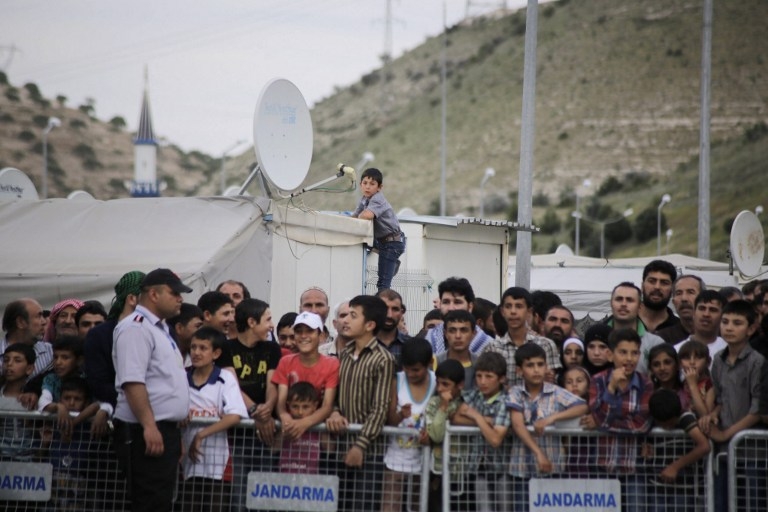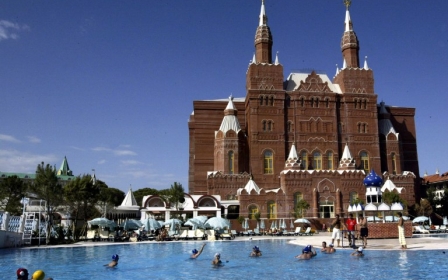EU to grant Turkey visa-free travel under refugee deal

The EU will grant conditional approval for Turks to gain visa-free access to the Schengen zone on Wednesday, sources told AFP, meeting one of Ankara's key demands to keep a refugee deal alive.
The European Commission, the executive arm of the 28-nation EU, will say Turkey must still implement further measures in order to access the passportless Schengen area without visas by June, the sources said on Tuesday.
Ankara has demanded visa-free travel in exchange for taking back refugees and migrants who land in Greece under a controversial deal signed in March seeking to curb the influx as Europe grapples with its biggest migrant crisis since World War II.
EU member states and the European Parliament must still approve the Turkey visa plan after it clears the Commission, which is by no means a foregone conclusion as many countries have concerns over human rights in Turkey.
Turkey has to meet a list of 72 criteria - ranging from biometric passports to respect for human rights - that were set when Brussels and Ankara first talked about 90-day visa-free travel to the Schengen area.
Only 64 out of the 72 criteria are fulfilled and therefore the commission's offer would be conditional, a European source told AFP.
Turkey has pressed the EU to respect its promises over what Ankara regards as its big win from the deal which was signed at a summit on 18 March.
Schengen suspension
But Germany and France have proposed an emergency brake - or "snap-back mechanism" - under which it could halt visa-free travel if large numbers of Turks stay in the EU illegally or if there are a large number of asylum applications by Turks.
The EU struck the deal with Turkey to send back all "irregular" refugees and migrants who arrive in Greece after 20 March and are turned down for asylum, in a bid to halt the mass migration which has created enormous strain in Europe.
In exchange, the EU will resettle one Syrian refugee from camps in Turkey for every Syrian that Turkey takes back from the Greek islands, the aim being to discourage people from crossing to Greece in the first place.
The accord is awash with legal and moral concerns, and critics have accused the EU of sacrificing its values and overlooking Turkey's growing crackdown on free speech in order to secure the deal.
On Wednesday, the EU will also allow countries to extend border controls in the Schengen area as a result of the refugee crisis and recent terror attacks.
Germany, France, Austria, Denmark and Sweden requested the extension, saying the border situation remains "extremely volatile".
Since 2015, several countries in the 26-nation Schengen zone have reintroduced border controls due to the crisis - effectively suspending its principle of border-free travel.
European sources said the Commission was to approve the measure in line with its so-called "roadmap" for the restoration of the normal functioning of Schengen "by the end of the year".
EU rules say countries can reintroduce border controls for up to two years, in periods of up to six months at a time, in exceptional circumstances.
Dublin rules
Also on Wednesday, the EU is expected to unveil an overhaul of its asylum rules to more fairly share responsibility for migrants and refugees arriving in Europe.
The existing Dublin rules have been criticised as obsolete and unfair to countries like Greece, where most of the 1.25 million Syrian, Iraqi, Afghan and other refugees and migrants entered the bloc last year.
Under those rules, refugees and migrants seeking asylum must lodge their application in the country where they first arrived, and should be returned there if they try to move elsewhere in the bloc.
The Commission is expected to propose a special mechanism whereby refugees and migrants can be relocated to other countries if a crisis is declared - for example in Greece.
The Financial Times reported that countries that do not take their share could be fined $288,000 per person that they refuse to accept.
But the EU is expected to shun a complete overhaul of the Dublin rules.
Middle East Eye propose une couverture et une analyse indépendantes et incomparables du Moyen-Orient, de l’Afrique du Nord et d’autres régions du monde. Pour en savoir plus sur la reprise de ce contenu et les frais qui s’appliquent, veuillez remplir ce formulaire [en anglais]. Pour en savoir plus sur MEE, cliquez ici [en anglais].




